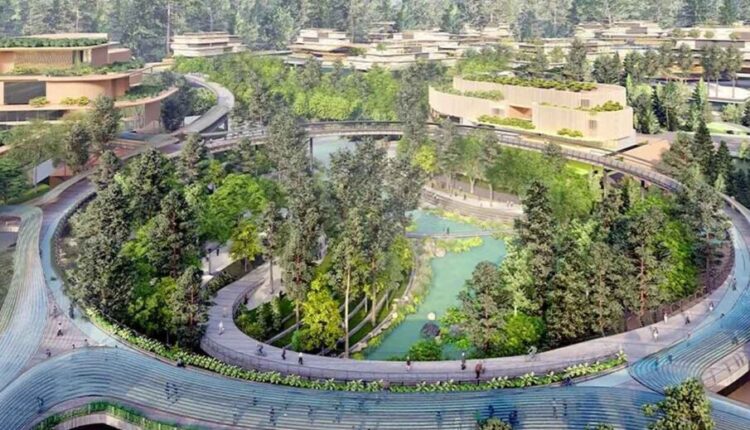President Jokowi’s Big Role in Realizing IKN as a Sustainable Smart City
By: Nur Fajar Bustomi )*
The Indonesian Capital City (IKN) in East Kalimantan is one of the strategic projects proposed by President Joko Widodo (President Jokowi) in realizing Indonesia as a competitive country in the global arena. One of the most prominent aspects of this project is the effort to make IKN a sustainable smart city that relies on environmentally friendly energy and advanced technology. Under President Jokowi’s leadership, IKN is designed not only as a new center of government, but also as a symbol of Indonesia’s progress in terms of modern urban governance.
President Jokowi has shown great commitment in building the IKN as a smart city. One of the concrete steps taken is the construction of a Solar Power Plant (PLTS) in the IKN area. The PLTS built in Sepaku District, Penajam Paser Utara Regency, East Kalimantan will be the forerunner of environmentally friendly energy that drives the entire electrical system in the IKN.
The PLTS in IKN is special because it relies on 100% clean energy from sunlight, without using fossil fuels. The solar panels that stretch across 80 hectares of land have been able to produce 10 Megawatts (MW) of electricity which is used to power the core area of the IKN government center. The target is that by the end of 2024, the capacity of this PLTS will be increased to 50 MW, which is part of the government’s commitment to providing environmentally friendly electricity in IKN.
General Manager of PLN Distribution Unit of East and North Kalimantan, Agung Murdifi, emphasized that his party is ready to meet the electricity needs in IKN by implementing the latest technology, including an electricity system based on State of the Art Technology and the concept of green, smart, and beautiful electricity . This technology is expected to make IKN a model of a smart city that maximally utilizes renewable energy.
Meanwhile, Acting Chairman of OIKN and Minister of Housing and Public Works Basuki Hadimuljono, stated that the integration of advanced technology into smart city infrastructure will not only improve operational efficiency, but also significantly improve the quality of life of the population. The Indonesian government, through the Ministry of Public Works and Public Housing (PUPR), has designed the development of the IKN with a smart city concept throughout the region. This concept includes the application of technology in various sectors, such as transportation, energy, waste management, and public services.
According to the Director General of Cipta Karya of the PUPR Ministry, Diana Kusumastuti, the development of smart city- based infrastructure in the IKN will improve the quality of life of the community while creating more effective and transparent governance. President Joko Widodo has also prepared various policies to support the development of this smart city, starting from improving public transportation, reducing carbon emissions, to utilizing renewable energy as the main source of electricity.
Not only that, IKN is also equipped with an electricity network based on Smart Light technology that allows for more efficient and integrated energy use. This electricity network will be built underground through the Multi Utility Tunnel (MUT) prepared by the PUPR Ministry. With these steps, the government under the leadership of President Jokowi is fully committed to making IKN a real example of the implementation of an environmentally friendly smart city in Indonesia.
One of the major advantages of implementing the smart city concept in IKN is the reduction of carbon emissions and the positive impact on the environment. The construction of PLTS in IKN is estimated to reduce carbon dioxide emissions by up to 104,000 tons per year. In addition, IKN is able to produce green energy of around 93 gigawatt hours (GW) per year, which significantly reduces Indonesia’s dependence on fossil fuels.
By utilizing a renewable energy-based electrical system and advanced technology, IKN will become a city with more efficient mobility. In line with President Jokowi’s vision to create a sustainable city, all IKN residents are required to use 100% electric vehicles, both for public and private transportation. This policy is expected to make IKN a green energy-based city that supports environmentally friendly transportation.
President Jokowi also pays great attention to the use of information and communication technology (ICT) in improving public services. One of the innovations that is already running is the JAKI (Jakarta Kini) application, which is one of the successful examples of smart city implementation in Jakarta. With a similar concept, IKN is expected to become a city of the future that integrates technology in various aspects of life to create a more efficient and sustainable life.
The development of the Indonesian Capital as a sustainable smart city is one of the major projects initiated by President Jokowi in an effort to realize a more advanced and competitive Indonesia. Based on environmentally friendly energy, advanced technology, and policies that support effective city governance, the IKN is projected to become a model of a smart city that can be an example for other cities in Indonesia and the world. The government’s commitment under President Jokowi’s leadership shows a long-term vision in creating a city that is not only environmentally friendly, but also provides a better quality of life for the entire community.
)* Student of Urban and Regional Planning Engineering Department in Makassar
